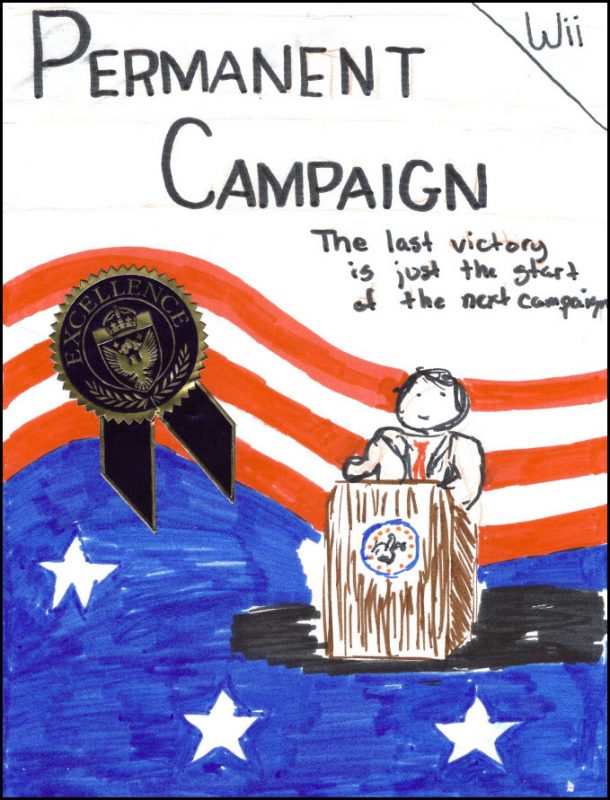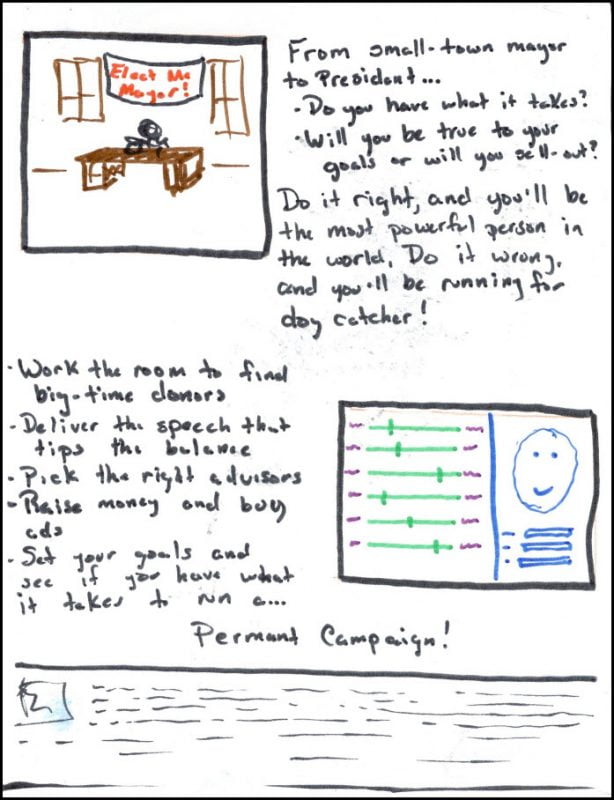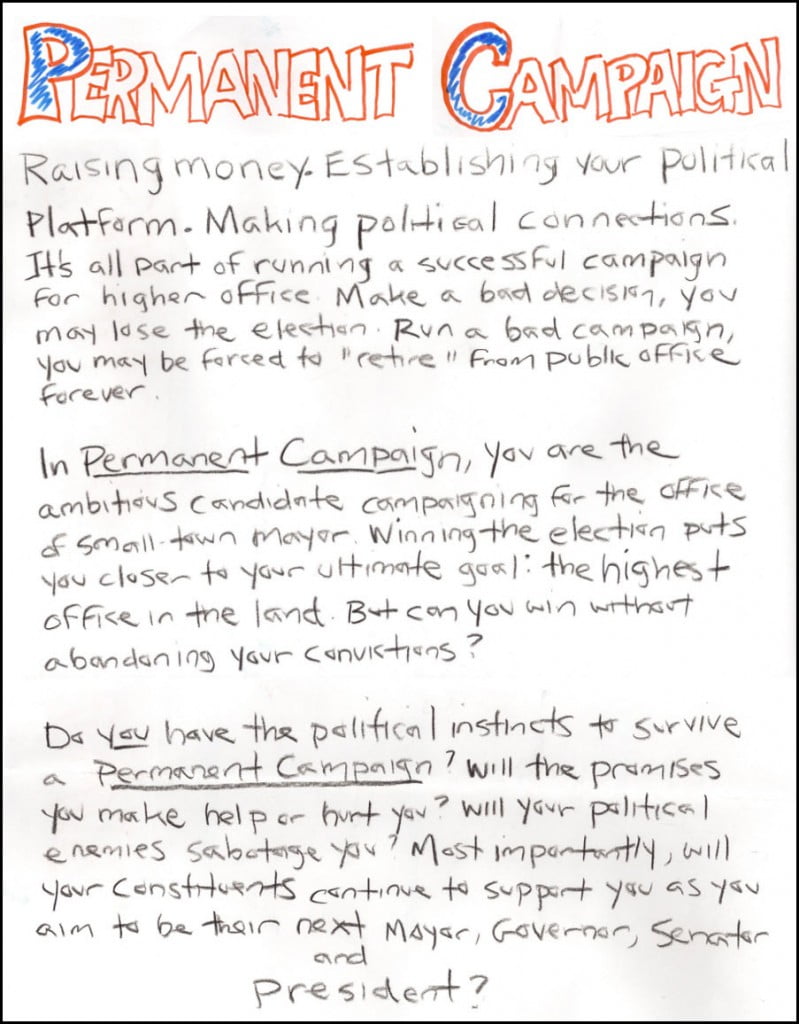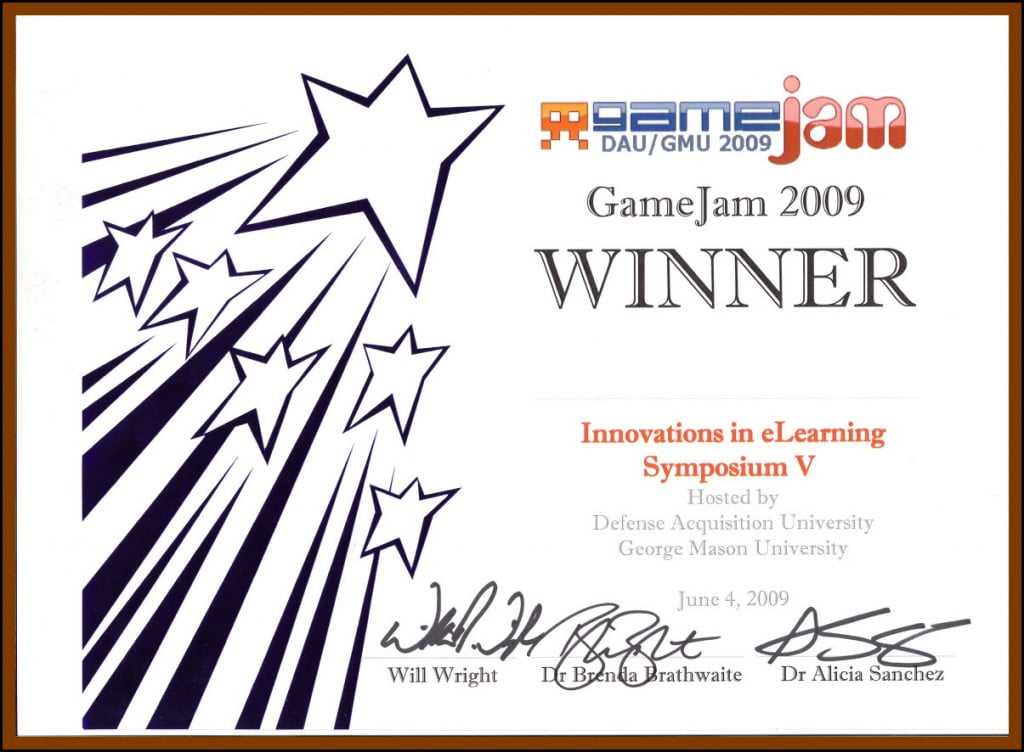The real excitement in the Game Design Workshop happened in the afternoon, when I participated in a “GameJam” (a timed contest of design and creativity where you get a set amount of time to design the core concepts of a game). In this particular event, we a little less than three hours from start to finish to come up with the conception for a game, how the gameplay works and what the game look like. During the short time period we also had to come up with enough visual and verbal documentation of the game that it could be judged without us being there to present it.
Teams were formed at the beginning of the event. Our team was Dan Petrak, Richard Sebastian, Stephen Martin, and myself (only Dan and I knew each other prior to the GameJam). We were armed with a box of markers, a box of colored pencils, an easel of paper, and a trifold board to post our videogame design. One final detail — you don’t know what the game is supposed to be about until the beginning of the contest. With two hours and 45 minutes of time to completion, we got our game theme, which was “long-term and short-term goal setting.” Ouch.
At least 45 minutes of our initial time was simply spent brainstorming ideas for the types of activities that would involve long-term and short-term goal setting and throwing out the ones that would make lame games. We toyed with game ideas that would involve setting goals in the real world (e.g. managing a national park, weight loss, life-long learning), we toyed with the idea of creating a game based in a social networking platform like Facebook where you could set long-term goals and then perform short-term goals in the real world to earn points in FB (think mafia wars, but an environmental or health theme) … but none of these ideas sounded like much fun or easily designable. With about two hours to go, we hit on the idea to design a videogame based on campaigning for political office – a process that is notoriously about balancing the short-term goals of getting reelected and raising campaign finances against the long-term goal of furthering the causes that drew you to office in the first place.
Once we had the general concepts down, we still have to think about how the gameplay would actually progress and the mini games that would make it fun to play. We also had to figure out how to depict all of this in a way that someone seeing our descriptions and drawings would understand intuitively what this game would be like to play. Oh, one more thing I forgot to mention … just to add a little pressure, one of the judges for this contest is Will Wright (he made a couple games you might have heard of, like SimCity, the Sims, and most recently, Spore).
Keep in mind that none of us are artists (two mathematicians and two learning technologists), but everything on the game board that we presented had to be hand drawn and hand written. So with all of that and mind, here is the game we designed: Permanent Campaign. I’m giving your our “box” design here and a general description, but you should go check out the minigames and main game screens that I’ve scanned and archived here.



Raising money. Establishing your political platform. Making political connections. It’s all part of running a successful campaign for higher office. Make a bad decision, you may lose the election. Run a bad campaign, you may be forced to “retire” from public office forever.
In Permanent Campaign, you are the ambitious candidate campaigning for the office the small-town mayor. Winning the election puts you closer to your ultimate goal: the highest office in the land. But can you win without abandoning your convictions?
Do you have the political instincts to survive a permanent campaign? Will the promises you make help or hurt you? Will your political enemies sabotage you? Most importantly, will your constituents continue to support you as you aim to be their next mayor, governor, senator, and president.
Our team worked extremely well together. Two people (Dan and Richard) primarily worked on copy and two people (me and Stephen) primarily worked on drawing screenshots and the game box. All of us continued to contribute ideas and brainstorm as we worked on getting the details on paper.
There were ten teams in the GameJam, and the games were on display all day Thursday for judging. I met Will Wright after his keynote (wait for another blog post on that talk and all of its mathematical awesomeness), and got my picture taken which was super cool.
But the real coolness was yet to come, as it turned out (that night) that our team WON the GameJam with Permanent Campaign! So another round of picture taking with the contest judges and the rest of the team (yes, including Will Wright) and then Will grabbed my camera and took a picture of our team with our winning project (I’m considering adding “Will Wright took MY picture” to my resume). Dan was smart enough to ask what he thought of our project, and Will said that he liked the way we had brought in the need to balance short-term and long-term goals using politics as the vehicle and he said that “It looks like it would be a fun game – I’d like to play it!”

For the time being, I am framing this winning GameJam award certificate and putting it in the space I’ve left for my Ph.D. At the moment, it seems like a far more impressive accomplishment!





